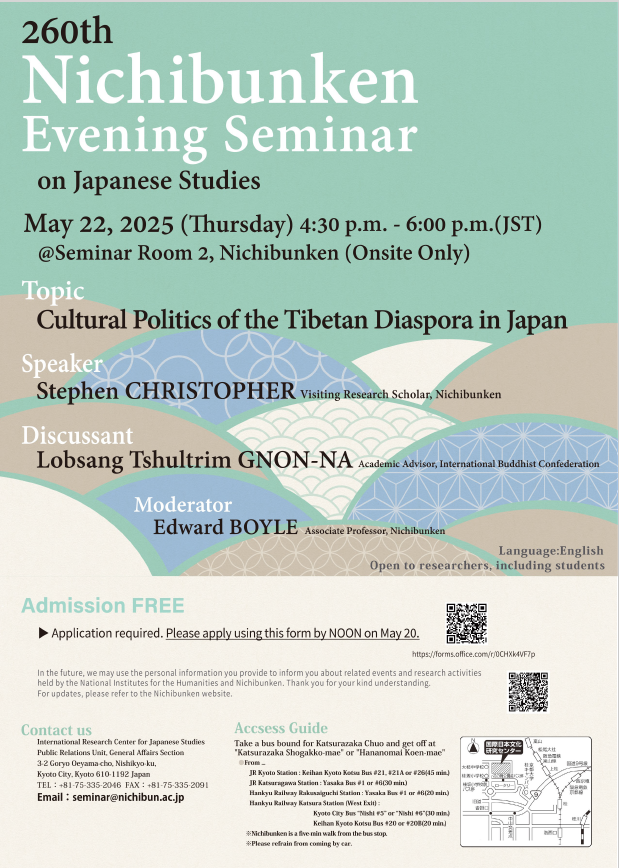The 260th Nichibunken Evening Seminar
To members of the media: If you wish to conduct interviews or media coverage, please inform the reception desk.
 Theme
Theme
 Overview
Overview
 ▶ view PDF
▶ view PDF
|
This lecture is based on fieldwork data collected from 2019-25 that I am now writing up as a book-length manuscript. It explores various modes of Japanese engagement with the Tibetan diaspora and diasporic Tibetan Buddhism -- roughly categorized into two discrete but overlapping polarities. To one side, Japanese (primarily women) seek healing and self-transformation by travelling to Tibet and Tibetan areas of South Asia, having interpersonal and romantic relationships with Tibetans, studying Tibetan Buddhism and language, volunteering in Tibet support groups, and overall participating in the preservation of Tibetan culture in multifarious ways. Their self-narratives reveal an overall teleology of brokenness to belonging and restored health; and their support of the Tibetan diaspora intersects with Japanese subcultures of healing, spiritual business, new religiosity, and progressive multiculturalism. To analyze these dynamics, I focus on manga and ethnographic case studies from Japan and India. To the other side, the Tibetan diaspora in Japan has, from its core inception in 1965, received ideological and financial backing from conservative, anti-CCP, pan-Asianist organizations and individuals. Their support raises questions about the politics of refugee support and the downstream consequences of refugee pragmatism. By analyzing these two poles of Tibetan support, this lecture situates the Tibetan diaspora in the unique sociopolitics of Japan, which contrasts with Euro-America in important ways. While focused on Japan, data is put in conversation with dynamics in South and Southeast Asia. The lecture is structured as an overview of these themes and I encourage discussion that can inform the final manuscript. |
|
|---|---|---|
-
SpeakerStephen CHRISTOPHER
Visiting Research Scholar, International Research Center for Japanese Studies
- DiscussantLobsang Tshultrim GNON-NAAcademic Advisor, International Buddhist Confederation
- ModeratorEdward BOYLEAssociate Professor, International Research Center for Japanese Studies
 Information
Information
| Date: | 2025.05.22 (Thu) |
|---|
- Place:
- Seminar Room 2, International Research Center for Japanese Studies (Onsite Only)
- Start time:
- 16:30(JST)
- End time:
- 18:00
- Target audience:
- Open to researchers, including students
- Language:
- English
- Registration:
- Required.
Please sign up for the seminar using this form by NOON on May 20.
- Contact details for inquiries:
-
Public Relations Unit, General Affairs Section,
International Research Center for Japanese Studies
Email seminar*nichibun.ac.jp (Please replace * with @.)
- Note:
- In the future, we may use the personal information you provide to inform you about related events and research activities held by the National Institutes for the Humanities and Nichibunken. Thank you for your kind understanding.

